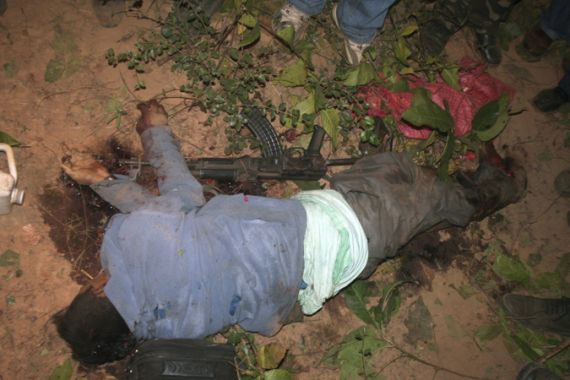Indian forces claim Maoist leader killed
Koteshwar Rao or Kishenji resisted state governments in eastern India for 30 years.

Security forces are said to have killed a senior military commander of India’s Maoist rebels in the country’s eastern jungle, the Indian government has said.
Koteshwar Rao, known as Kishenji, had fought a three-year battle with the state governments of West Bengal and Jharkhand. According to the government, he was shot dead after a 30-minute gunfight in the Burisole forests of West Midnapore district, 10km from the Bengal-Jharkhand border.
Kishenji was known to be the third in command of the Maoist guerrillas and would be the latest in a series of senior leaders of the movement to be killed.
|
“Officers on the spot said it was Maoist leader Kishenji … 99 per cent sure it was Kishenji.“ – RK Singh, Indian interior minister |
The Maoists, also known as Naxalites after the village of Naxalbari where the group started in the late 1960s, have a presence in roughly one-third of India’s administrative districts.
The group has been described by Manmohan Singh, India’s prime minister, as a major strategic security threat to the country.
‘Huge vacuum’
India’s interior ministry on Friday confirmed a man was killed in a firefight during an operation to capture the leader.
“Officers on the spot said it was Maoist leader Kishenji … 99 per cent sure it was Kishenji,” RK Singh, India’s interior minister, told the PTI news agency.
The rebel leader, who had managed to evade capture for three decades, often appeared with his back to cameras in news reports and with his head covered by a scarf and a rifle slung over one shoulder.
“Kishenji’s death leaves a huge vacuum on the Maoist movement [which] relied on him to get their message across in the media,” said Al Jazeera’s Sohail Rahman, reporting from New Delhi.
Naxalite violence
Kishenji was a politburo member of the banned Communist Party of India and was one of the movement’s most experienced military commanders. He claimed responsibility for an attack on a camp in 2010 in which 24 paramilitary policemen were killed.
The first wave of Naxalite violence lasted from the late 1960s into the 1970s, when it was crushed by authorities. It returned as a major problem in the last decade. The Maoists have been criticised for running show trials that impose harsh punishments and for extorting cash from local businesses.
The Maoists say they are fighting for the rights of poor peasants and landless labourers, and blame the federal
government for doing little for the welfare of poor tribal people.
The rebels feed off the resentment of millions of poor people who have not shared the benefits of the boom in India’s economy, which grew 8.5 per cent in 2010.